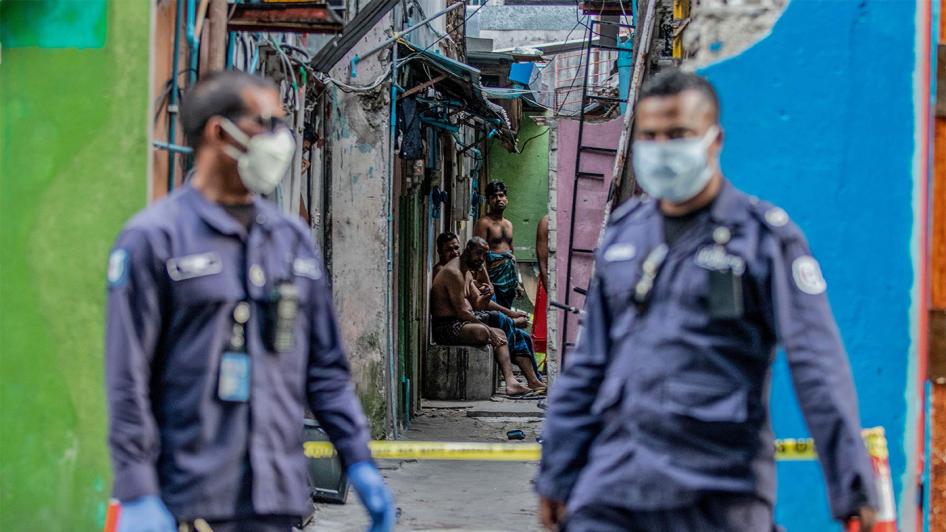(New York) – The Maldives authorities responded to the Covid-19 pandemic by cracking down on peaceful protests and compounding threats to migrant workers and other vulnerable groups, Human Rights Watch said today in its World Report 2021.
President Ibrahim Mohamed Solih promised after taking office in 2018 to restore rights eroded by longstanding authoritarian rule, but his administration has not confronted growing threats to civil society groups or the influence of extremist Islamist groups on the police and courts.
“The Maldives government’s poor response to the Covid-19 crisis magnified existing abuses, especially for migrant workers, and exposed the government’s failure to address online intimidation and other threats by extremist groups against rights activists,” said Patricia Gossman, associate Asia director at Human Rights Watch. “In 2021, the government should prioritize efforts to protect everyone’s rights to peaceful expression and assembly.”
In the 761-page World Report 2021, its 31st edition, Human Rights Watch reviews human rights practices in more than 100 countries. In his introductory essay, Executive Director Kenneth Roth argues that the incoming United States administration should embed respect for human rights in its domestic and foreign policy in a way that is more likely to survive future US administrations that might be less committed to human rights. Roth emphasizes that even as the Trump administration mostly abandoned the protection of human rights, other governments stepped forward to champion rights. The Biden administration should seek to join, not supplant, this new collective effort.
Throughout 2020, the authorities cracked down on foreign workers protesting wage abuses that escalated during Covid-19 lockdowns. In July alone, the police arbitrarily detained more than 80 migrants during protests, a number of whom were ultimately deported without their owed wages. However, as part of their healthcare response, the authorities established dedicated Covid-19 clinics for migrant workers that did not require them to show work permits or other documentation.
The pandemic spotlighted entrenched abuses against migrant workers – roughly one-third of the resident population – including wage theft, passport confiscation, and unsafe living and working conditions. The government did take action to address some labor concerns, including regularizing undocumented migrants and establishing a national task force on the issue.
The Solih administration failed to adequately investigate extremist Islamist groups for targeting social justice activists, instead often capitulating to the groups’ demands. Online intimidation of human rights groups had a chilling effect on civil society. In June, extremist groups initiated a social media campaign demanding that the government ban the women’s rights organization Uthema for being “anti-Islam,” after the group published a report on the government’s performance under the Convention on the Elimination of All Forms of Discrimination against Women.
Although the Maldives is one of the country’s most vulnerable to harm from climate change, the government has not adequately consulted local communities, or put in place sufficient measures to mitigate or adapt to the growing risk of floods and erosion. The results of climate change will have long-term effects on communities from loss of livelihoods.
Maldives: Pandemic Response Exposes Inequities, Abuse
Government Failed to Protect Rights Groups, Migrant Workers
Your tax deductible gift can help stop human rights violations and save lives around the world.
Most Viewed
-
April 17, 2024
West Bank: Israel Responsible for Rising Settler Violence

-
June 24, 2022
Q&A: Access to Abortion is a Human Right

-
April 27, 2021
A Threshold Crossed

-
October 29, 2020
“I Sleep in My Own Deathbed”

-
April 9, 2024
Gaza: Israel’s Imposed Starvation Deadly for Children


